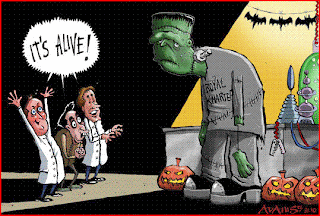MP Nadine Dorries tweet to Sunday Mirror reporter, as reported by the Mirror: "Be seen within a mile of my daughters and I will nail your balls to the floor... using your own front teeth. Do you get that?"
Martin Cloake
@MartinCloake on Twitter: "Is Nadine Dorries's suggestion an official part of the new press regulation plan?"
Robert Peston giving the James Cameron Memorial Lecture at City University: "I don't believe I would have been able to do what I've done at the BBC if I had worked all my life in regulated television. My ability to take calculated risks and break stories, that I believe to be important, owes a huge amount to the fact that I grew up and was trained in newspapers."
Steve Dyson on Local World chief' David 'Rommel' Montgomery's vision for the local press, on the Guardian's MediaBlog : "Rommel's missive makes no attempt to motivate, inspire or lead his troops; instead, he denounces their profession, embarrasses his managers and depresses the entire industry."
Andrew Miller, chief executive of parent Guardian Media Group, in the Independent: “The BBC is a frustrating competitor for us. It’s like a very good friend and has the great traits you love, but then several things really annoy you about them. I get frustrated that the BBC is the biggest state-subsidised Internet [operation] in the world. It is a global competitor for us in those different market places…to the advertising revenues that we go for.”
David Cameron on BBC Radio 4's Woman's Hour: "I've said what I've said about Page Three and The Sun and I haven't changed my views. But should we do more to try and help parents to protect their children from legal pornography on the internet? Yes I think we should, and again last week we made some big progress on that. You can control your children's access to newspapers and books and magazines."
Steve Dyson on Local World chief' David 'Rommel' Montgomery's vision for the local press, on the Guardian's MediaBlog : "Rommel's missive makes no attempt to motivate, inspire or lead his troops; instead, he denounces their profession, embarrasses his managers and depresses the entire industry."
Andrew Miller, chief executive of parent Guardian Media Group, in the Independent: “The BBC is a frustrating competitor for us. It’s like a very good friend and has the great traits you love, but then several things really annoy you about them. I get frustrated that the BBC is the biggest state-subsidised Internet [operation] in the world. It is a global competitor for us in those different market places…to the advertising revenues that we go for.”
David Cameron on BBC Radio 4's Woman's Hour: "I've said what I've said about Page Three and The Sun and I haven't changed my views. But should we do more to try and help parents to protect their children from legal pornography on the internet? Yes I think we should, and again last week we made some big progress on that. You can control your children's access to newspapers and books and magazines."
Iain Dale, on being axed as a columnist by the Eastern Daily Press after seven years, as reported by HoldTheFrontPage: "There aren’t many columnists who last seven years on any newspaper, even when they come as cheaply as I do!"
Early Day Motion 795 DEFENCE OF PUBLIC INTEREST AND THE PROSECUTION OF JOURNALISTS: "That this House recognises the need for journalists to pursue difficult stories in the public interest without fear of prosecution; is concerned about the situation facing journalists who have been arrested and charged in relation to charges of conspiracy to commit misconduct in a public office; believes that such charges, levied against individuals who had no role in the authorisation of payments nor responsibility for a workplace culture where such payments were institutionalised and where trade union recognition was not allowed, do nothing to tackle the real issue of corporate responsibility for any alleged wrongdoing; regrets that it is ordinary working journalists who are being targeted, whilst senior executives and the companies themselves escape blame; further regrets that to discount the public interest defence in bringing legal proceedings sets a very damaging precedent for the industry; and therefore calls on the Director of Public Prosecutions to ensure that a consistent and fair approach is taken in regard to such cases."
John Cleese
NUJ organiser Chris Morley in a statement on plans by Newsquest to transfer subbing of papers in the North East to Wales: "Even by Newsquest standards, is it breath-taking if management think no consequences will flow from sending local news around 270 miles from the far north of England to the southern fringe of Wales. The sorry reign of Paul Davidson as chief executive is due to come to a close on April Fools’ Day next year, but none of his journalists are laughing as he seems to be intent on carrying on right to the end with his nihilistic vision of dismantling quality journalism around his group."












